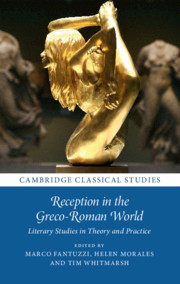Book contents
- Reception in the Greco-Roman World
- Cambridge Classical Studies
- Reception in the Greco-Roman World
- Copyright page
- Dedication
- Contents
- Figures
- Notes on Contributors
- Acknowledgements
- Abbreviations
- Altered States: Cultural Pluralism and Psychosis in Ancient Literary Receptions
- Part I Archaic and Classical Poetics
- Part II Classical Philosophy and Rhetoric, and Their Reception
- Part III Hellenistic and Roman Poetics
- Part IV Multimedia and Intercultural Receptions in the Second Sophistic and Beyond
- Chapter 12 Received into Dance? Parthenius’ Erōtika Pathēmata in the Pantomime Idiom
- Chapter 13 Sappho in Pieces
- Chapter 14 Hesiodic Rhapsody: The Sibylline Oracles
- Chapter 15 Homer and the Precarity of Tradition: Can Jesus Be Achilles?
- References
- Index
Chapter 13 - Sappho in Pieces
from Part IV - Multimedia and Intercultural Receptions in the Second Sophistic and Beyond
Published online by Cambridge University Press: 05 June 2021
- Reception in the Greco-Roman World
- Cambridge Classical Studies
- Reception in the Greco-Roman World
- Copyright page
- Dedication
- Contents
- Figures
- Notes on Contributors
- Acknowledgements
- Abbreviations
- Altered States: Cultural Pluralism and Psychosis in Ancient Literary Receptions
- Part I Archaic and Classical Poetics
- Part II Classical Philosophy and Rhetoric, and Their Reception
- Part III Hellenistic and Roman Poetics
- Part IV Multimedia and Intercultural Receptions in the Second Sophistic and Beyond
- Chapter 12 Received into Dance? Parthenius’ Erōtika Pathēmata in the Pantomime Idiom
- Chapter 13 Sappho in Pieces
- Chapter 14 Hesiodic Rhapsody: The Sibylline Oracles
- Chapter 15 Homer and the Precarity of Tradition: Can Jesus Be Achilles?
- References
- Index
Summary
Within the last fifteen years there have been two additions to Sappho’s corpus (the Cologne fragment on old age, published in 2004, and the more recent Brothers and Cypris poems, published in 2014) both discovered in Greco-Roman Egypt. Notwithstanding this fact there is a general tendency to treat Egypt as idiosyncratic: useful when some aspect of a recovered text fits a scholar’s notion of Sappho’s poetic practice or ancient reception in the Archaic or Classical Period, but otherwise dismissed as irrelevant in taste and in patterns of survival. To test this assumption, I consider the survival of Sappho’s poetry from two perspectives: what ancient Greek sources outside of Graeco-Roman Egypt reveal about literate (as opposed to performative) reception of Sappho and how papyrus and parchment sources recovered from Egypt nuance that picture. My conclusion is that reception outside of and within Egypt is remarkably similar, that it is not possible to make a case for more than a specialized readership in either location, and that ancient readers read Sappho no more frequently than other lyric poets who do not, however, command the modern attention.
- Type
- Chapter
- Information
- Reception in the Greco-Roman WorldLiterary Studies in Theory and Practice, pp. 319 - 343Publisher: Cambridge University PressPrint publication year: 2021



